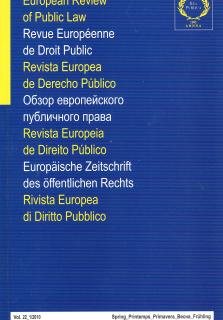
Twenty Years
of European Environmental Policy and Law:
An Overview of Certain Aspects
Any discussion about the future of environmental law should focus on the EU environmental policy and its main issues. The major issues of this policy are sustainable development and the prevention and precautionary principles, but also free access to environmental information and the environmental impact assessment as topics of the relevant legislation. Sustainable development can be defined as the development that engages the present needs without compromising in any way the future generation from appointing their own needs. To put it in other words, developing the current context must not damage the natural resources, endangering thus the future generation’s own developments. The prevention principle emphasizes the necessity of taking action on protecting the environment from an early stage, requiring at the same time that action is taken so that damage can be prevented. The best policy when it comes to the environment is preventing pollution rather than counteracting its effects. The precautionary principle was first mentioned in the Rio Declaration of 1992 as Principle 15 and aims at maximizing environmental protection in order to avoid potential damages. The precautionary principle is not only a principle of the environmental law but is also a moral and also political principle; it involves responsibility on the Community and the states’ side to intervene and protect the citizens from any risks. In the 1992 Rio Declaration, Principle 10 stated the importance of free access to environmental information. Environmental information consists of any form of factors, measures or activities that are likely to affect the environment or that are designed to protect it, or the related cost-benefit and economic analyses used and also including information on the state of human health and safety, the contamination of the food chain, conditions of human life, cultural sites and built structures. It is the obligation of the authorities to ensure free access to the environmental information.





















